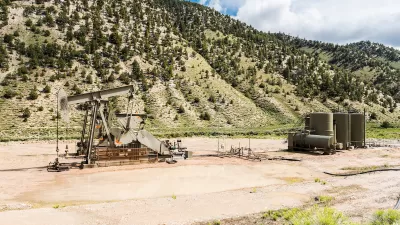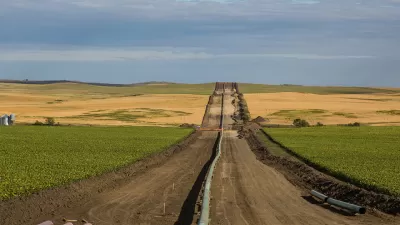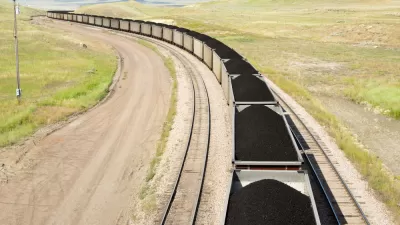Crude-by-Rail

Utah Oil Shale Extraction Dealt Major Setback
The Surface Transportation Board's approval in 2021 of a proposed 85-mile Uinta Basin Railway in Utah that would have enabled increased extraction of the world's largest source of oil shale was partially vacated by a federal appeals court last month.

Dakota Access Pipeline Owners Win Eminent Domain Appeal in Iowa Supreme Court
The Iowa Supreme Court affirmed a lower court ruling that found that the Iowa Utilities Board was justified in giving the private owners of the Dakota Access Pipeline the use of eminent domain. Climate change was considered in the ruling.

Spokane Voters to Decide Whether to Regulate Oil and Coal Trains
Proposition 2, the Safer Spokane Initiative, would require railroads to reduce health and safety risks posed by certain types of oil and coal trains traveling through specified parts of the city or risk being fined.
Bay Area City Rejects Crude-by-Rail Terminal, Could Set Precedent
Crude-by-rail opponents are hoping that Benicia's rejection of a proposed rail terminal for a Valero refinery will set a precedent: it was enabled by a U.S. Surface Transportation Board decision allowing the city to have the final word.
Will Columbia River Gorge Oil Train Derailment Be a 'Death Knell' for Bakken Crude-by-Rail?
After a long night fighting a fire that erupted when a 96-car oil train carrying Bakken crude from North Dakota derailed on June 3 in Mosier, Oregon, the fire chief called for an end to shipping the volatile oil by rail.
A Reversal of Direction for TransCanada
TransCanada, the company that hoped to build a Canada-to-Gulf Coast pipeline, now wants to build one to carry Bakken oil from North Dakota to Canada, transporting oil now hauled only by trains that have caused recent deadly explosions.
Montana Oil Train Derailment: Seventh of 2015
An estimated 35,000 gallons of crude spilled from four of 22 toppled tank cars of a 106-car oil train near Culbertson in northeast Montana on July 16. Unlike other oil train derailments, no fiery explosions occurred.
New Crude-by-Rail Rule Restricts Access to Information
A May 1 Federal Railroad Administration rule on moving crude by rail was supposed to make routing information more accessible to the the public, but due to lobbying by the rail industry, it will do just the opposite.
Five Days after DOT Releases Crude-by-Rail Rule, Another Oil Train Explodes
Critics warned that a Department of Transportation rule allowing up to 10 years to phase out existing oil tank cars would result in more explosions. The rule was issued on May 1; an explosion occurred May 6.
Older Oil Tank Rail Cars Face Three-Year Deadline to be Replaced
Following up on last month's emergency rule addressing trains speeds, the Transportation Department issued new rules addressing tanker car standards, long thought to be one of the most important factors contributing to fiery oil tank car explosions.
Emergency Crude-by-Rail Safety Orders Take Effect
The emergency rules issued by DOT, including lowering oil-train speeds to 40 mph in urban areas, go into effect on April 20. They are in addition to rules expected to be released May 12 that address oil tanker car construction.
Where Have All the Oil Trains in California Gone?
While many California were protesting oil trains carrying the hazardous Bakken crude, a funny thing happened—they stopped coming. While protests may have delayed the construction of new oil terminals, economics is at the root of the slowdown.
Crude-by-Rail's New Workhorse No Better than the Old Workhorse
The new oil tank cars were supposed to be key to preventing the fiery explosions associated with oil-train derailments. However, four recent explosions since Feb. 14, with two occurring last Thursday and Saturday, all involved the new tankers.
Cause of Crude-by-Rail Explosions Identified
The Wall Street Journal's senior energy reporter, Russell Gold, is interviewed on NPR about the February 16 derailment and explosion in West Virginia of an oil-train hauling 109 tanker cars of Bakken crude from North Dakota.
704,000 Residents in the Shadow of Philadelphia's Crude-by-Rail Infrastructure
Two major rail lines provide crude oil shipments to refineries and terminals in the Philadelphia metropolitan area. A surprising number of residents would face evacuation in the event of a fire on the route.
Canada to Hold Shippers, Railways Fully Accountable for Oil-Train Derailments
Since the July 2013 derailment and explosion of an oil train in Lac-Mégantic, Quebec* killed 47, Canada has contributed C$155 million toward the rebuilding effort because the railroad's insurance was insufficient.
Nebraska Supreme Court OKs Keystone XL; U.S. Senate has the Next Move
The House voted for the tenth time to approve the pipeline, and a split decision by the Nebraska Supreme Court removes a key objection of President Barack Obama to ruling on Keystone XL. The Senate begins debate Monday.
Could Keystone XL Become the Next Casualty of Falling Oil Prices?
Recently we noted that Chevron had dropped their Arctic lease due to falling oil prices. With falling gasoline prices, Americans may no longer see the Keystone XL pipeline as urgent. In addition, President Obama appears likely to oppose the project.
After Keystone Delay, Enviros Challenge Other Pipelines
After successfully stalling the Keystone XL pipeline that would transport tar sands crude from Alberta to Gulf area refineries, environmental activists are targeting other proposed pipelines, although the result may be more crude-by-rail shipments.
North Dakota to Reduce Volatility of Bakken Crude-By-Rail
Bakken crude is considered more volatile than other types of oil, which presents a safety problem when moved by rail. New regulations approved Tuesday require oil producers to separate flammable and volatile liquids prior to shipment by rail.
Pagination
Urban Design for Planners 1: Software Tools
This six-course series explores essential urban design concepts using open source software and equips planners with the tools they need to participate fully in the urban design process.
Planning for Universal Design
Learn the tools for implementing Universal Design in planning regulations.
planning NEXT
Appalachian Highlands Housing Partners
Mpact (founded as Rail~Volution)
City of Camden Redevelopment Agency
City of Astoria
City of Portland
City of Laramie


































